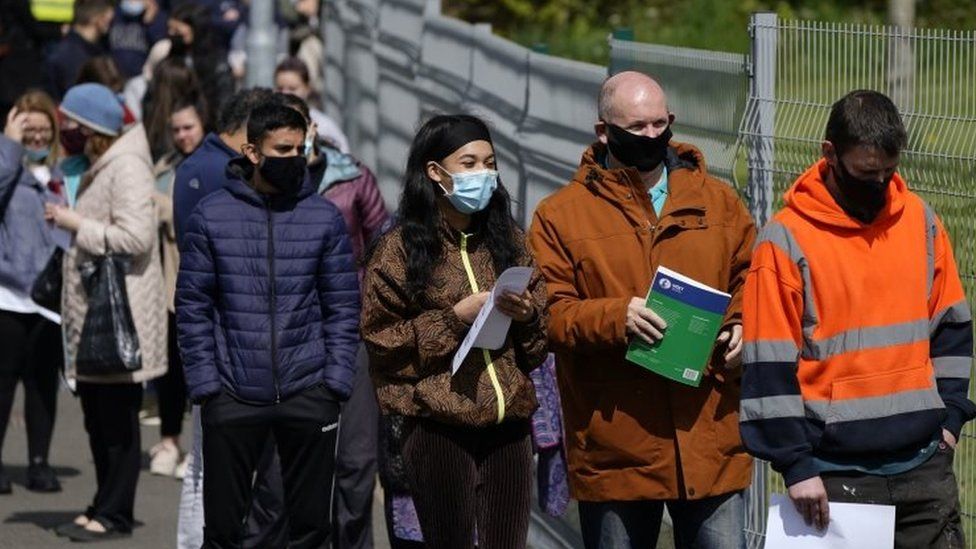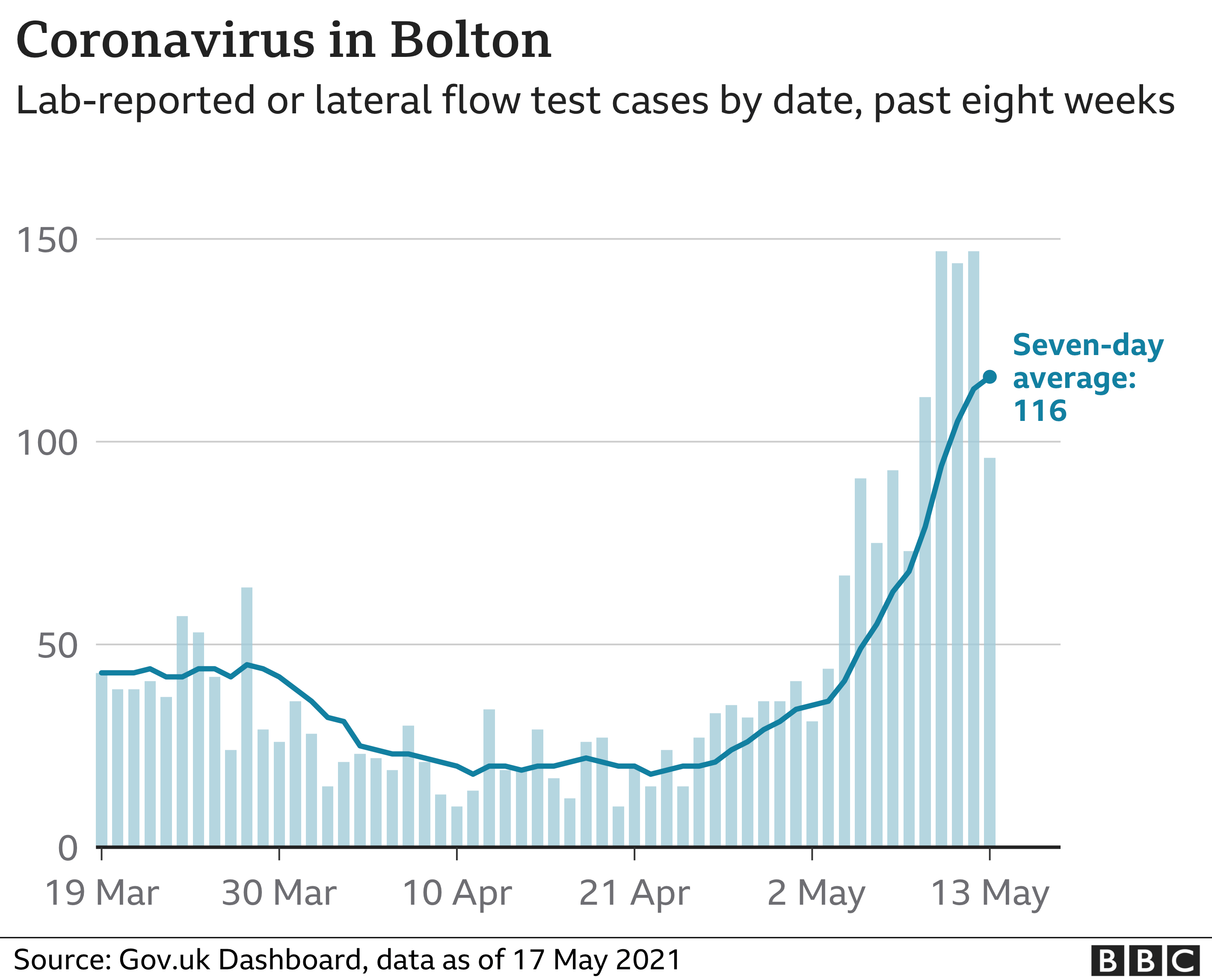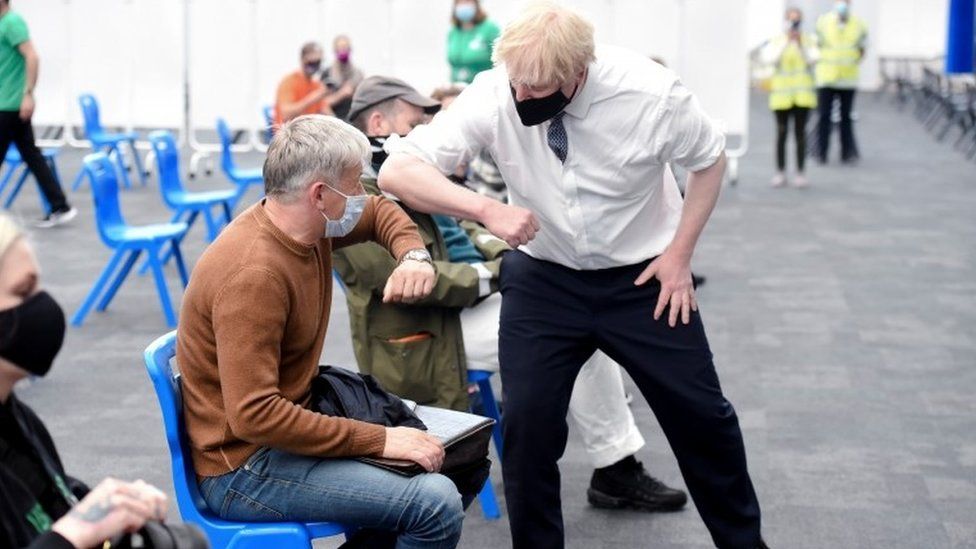
It will be a few days before the government can draw any conclusions about whether to deviate from England’s current roadmap out of lockdown, the prime minister has said.
The government plans to end the remaining legal limits on social contact in England from 21 June.
But there is increasing concern about the spread of the Indian variant.
Boris Johnson said there was nothing “conclusive” in the current data to suggest the plan needed to change.
Data from hotspots such as Bolton, was under “close” review, he said.
Speaking on a visit to a vaccination centre in London, Mr Johnson continued to urge people to be cautious.
He said the situation with the Indian variant was “under very careful, close review”, saying: “We’re looking at all the data as it comes in from places like Bolton, Blackburn, Bedford, Sefton.”
Mr Johnson said they were trying to understand if the Indian variant was more transmissible and “to what extent our vaccine programme has sufficiently fortified us”.
“We’ve got a few more days of looking at that data,” he said.
It comes as the UK recorded another seven deaths within 28 days of a positive test and 2,412 new cases.
On Monday the government said 86 local councils in England had five or more cases of the variant first discovered in India, which is thought to be more transmissible.
In Bolton, a new vaccine centre has opened up and ministers have been stepping up calls for people to book vaccinations as soon as they are offered appointments.


The prime minister’s official spokesman said that while the government was not ruling out measures such as local lockdowns at this stage, it was “too early to speculate” on what future measures it may need to take.
Asked if a decision was expected sooner than 14 June on progressing to the final step of England’s roadmap, the spokesman said that in relation to certification and social distancing, ministers “do want to update pubs and businesses, if possible, before 14 June”.
But he added they needed to “allow the experts to do their work” and “couldn’t be more specific on timings”.
The government has already warned its next review of social distancing rules – set to take place by the end of May – may be delayed because of concern over the variant.
On Monday millions of people were able to enjoy new freedoms – such as drinking indoors in pubs, hugs with loved ones and foreign holidays – for the first time in months, under the latest relaxation of rules across England, Wales and most of Scotland.

However, Labour has accused the government of “giving out conflicting and confused advice” about travel to countries on the amber travel list, where people must quarantine for up to 10 days on their return to the UK.
Government guidance states people should not travel to amber list countries.
But earlier Environment Secretary George Eustice suggested in a BBC interview that people could travel to such destinations if they “feel the need” to visit family or friends.
Asked about the issue, Mr Johnson said it was “very important people grasp what the amber list is – not somewhere to go on holiday”.
He said travellers should only go to these countries for “pressing family or business reasons”. Those who break their self-isolation period on returning to the UK from these destinations face £10,000 fines, he added.
Yvette Cooper, who chairs the Commons Home Affairs Committee, said the current traffic light system was “very messy” and “clearly isn’t working”, adding that it should be linked to legal restrictions.
“We all seem to be in a position where the government has opened up to summer holiday travel by accident, by making it possible, but at the same time, a day later, saying ‘no, people should not be travelling to amber countries,'” the Labour MP told BBC Radio 4’s World at One programme.

- LOOK-UP TOOL: How many cases in your area?
- LOCKDOWN RULES: What are they and when will they end?
- TRAVEL: Which countries are on the green list?

Meanwhile, Prof Andrew Pollard, director of the Oxford Vaccine Group, which developed the AstraZeneca vaccine, has said it feels “morally wrong” that children in some richer countries are being offered a Covid-19 jab before some high-risk people in poorer countries.
He told the All Party Parliamentary Group on coronavirus: “There are many unvaccinated people in the world whilst people whose risk is extremely low are being vaccinated, including children who have near to zero the risk of severe disease or death.
“That inequity is absolutely plain to see at this moment in a very troubling way.”

- HACKING YOUR HEALTH: Can tech be used to stop ageing and help us live beyond 100?
- “AT ITS CORE, DRAG IS CONNECTION”: Has RuPaul’s Drag Race moved drag into the mainstream?

